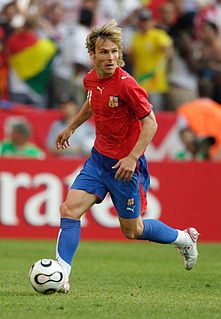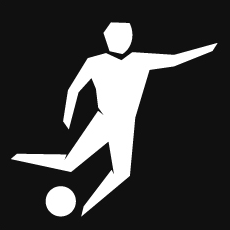
Association football, more commonly known as simply football or soccer, is a team sport played with a spherical ball between two teams of 11 players. It is played by approximately 250 million players in over 200 countries and dependencies, making it the world's most popular sport. The game is played on a rectangular field called a pitch with a goal at each end. The object of the game is to outscore the opposition by moving the ball beyond the goal line into the opposing goal. The team with the higher number of goals wins the game.

FIFA is a non-profit organization which describes itself as an international governing body of association football, fútsal and beach soccer. It is the highest governing body of association football.

The Union of European Football Associations is the administrative body for football, futsal and beach soccer in Europe. It is one of six continental confederations of world football's governing body FIFA. UEFA consists of 55 national association members.
Union Royale Belge des Sociétés de Football Association ASBL v Jean-Marc Bosman (1995) C-415/93 is a 1995 European Court of Justice decision concerning freedom of movement for workers, freedom of association, and direct effect of article 39 of the TEC. The case was an important decision on the free movement of labour and had a profound effect on the transfers of footballers within the European Union (EU).

In the sport of association football, the referee is the person responsible for enforcing the Laws of the Game (LOTG) during a match. He or she is the final decision-making authority on all facts connected with play, and is the only official on the pitch with the authority to start and stop play and impose disciplinary action against players during a match. At most levels of play the referee is assisted by two assistant referees, who are empowered to advise the referee in certain situations such as the ball leaving play or infringements of the Laws of the Game occurring out of the view of the referee; however, the assistant referees' decisions are not binding and the referee has authority to overrule an assistant referee. At higher levels of play the referee may also be assisted by a fourth official who supervises the teams' technical areas and assists the referee with administrative tasks, and, at the very highest levels, additional assistant referees and/or video assistant referees.
The Singapore Premier League is a men's professional association football league sanctioned by the Football Association of Singapore, which represents the sport's highest level in Singapore.
The United States soccer league system is a series of professional and amateur soccer leagues based, in whole or in part, in the United States. Sometimes called the American soccer pyramid, teams and leagues are not linked by the system of promotion and relegation typical in soccer elsewhere. Instead, the United States Soccer Federation (USSF) defines professional leagues in three levels, called divisions, with all other leagues sanctioned by the USSF not having an official designated level or division.

In sports, an ejection is the removal of a participant from a contest due to a violation of the sport's rules. The exact violations that lead to an ejection vary depending upon the sport, but common causes for ejection include unsportsmanlike conduct, violent acts against another participant that are beyond the sport's generally accepted standards for such acts, abuse against officials, violations of the sport's rules that the contest official deems to be egregious, or the use of an illegal substance to better a player's game. Most sports have provisions that allow players to be ejected, and many allow for the ejection of coaches, managers, or other non-playing personnel.

In association football, a substitute is a player who is brought on to the pitch during a match in exchange for an existing player. Substitutions are generally made to replace a player who has become tired or injured, or who is performing poorly, or for tactical reasons. Unlike some sports, but like in baseball, a player who has been substituted during a match takes no further part in it.

In the sport of association football, fouls and misconduct are acts committed by players which are deemed by the referee to be unfair and are subsequently penalised. An offence may be a foul, misconduct or both depending on the nature of the offence and the circumstances in which it occurs. Fouls and misconduct are addressed in Law 12 of the Laws of the Game.

In association football, kit is the standard equipment and attire worn by players. The sport's rules specify the minimum kit which a player must use, and also prohibit the use of anything that is dangerous to either the player or another participant. Individual competitions may stipulate further restrictions, such as regulating the size of logos displayed on shirts and stating that, in the event of a match between teams with identical or similar colours, the away team must change to different coloured attire.
The FIFA Two refers to Colin Healy and Gareth Farrelly, two Irish international football players who were prevented from playing for Cork City as they had already played for two other clubs in the 2006-07 period. After lobbying from Ireland's football governing body, the Football Association of Ireland, FIFA ultimately changed its transfer regulations in January 2008.

The association football tournament at the 2012 Summer Olympics was held from 25 July to 11 August, and was the only sport to begin before the official opening day of the Olympic Games, two days before the opening ceremony. It was also the only sport to be held at multiple venues outside London, with Manchester, Glasgow, Newcastle, Coventry and Cardiff all hosting matches. The finals were played at Wembley Stadium. Associations affiliated with FIFA were invited to send their senior women's and men's under-23 national teams to participate; men's teams were allowed to augment their squads with three players over the age of 23. Five hundred and four football players competed for two sets of gold medals.
The Pelé law is a Brazilian law that forces professional sports clubs to observe business law and pay tax within two years.
The Webster ruling is a test case in association football law involving Andy Webster, a defender formerly with Heart of Midlothian football club in Edinburgh, Scotland. In September 2006 he became the first player to exploit the updated transfer regulations of FIFA, football's governing body, which stipulated that players are able to unilaterally walk away from a contract after a fixed period, regardless of the duration of the contract itself. Although the long-term effects of the decision remain unclear, it has been compared to the landmark Bosman ruling of 1995 in its potential significance.

Park Jong-woo is a South Korean football player, who currently plays for Busan IPark as a midfielder. He has previously played for the Chinese club Guangzhou R&F and also in the UAE Arabian Gulf League for Al Jazira and Emirates. He has represented South Korea at age group and senior level, including the Men's tournament at the 2012 Summer Olympics, and was part of the South Korean squad for 2014 FIFA World Cup in Brazil.
Edgardo Obregón ) is an American soccer player who currently plays for Weston FC in USL League Two, as well as the Reinhardt University Eagles.
The 2018 Singapore Premier League was the inaugural season of the Singapore Premier League, the top-flight Singaporean professional league for association football clubs. The season began on 31 March 2018, and concluded on 3 October 2018. Albirex Niigata (S) won the league and successfully defended their title.
The 2020 Singapore Premier League is the 3rd season of the Singapore Premier League, the top-flight Singaporean professional league for association football clubs, since its rebranding in 2018. The champions of the 2020 Singapore Premier League will qualify for the AFC Champions League group stage automatically.
The 2021 Singapore Premier League is the 4th season of the Singapore Premier League, the top-flight Singaporean professional league for association football clubs, since its rebranding in 2018. The champions of the 2021 Singapore Premier League will qualify for the AFC Champions League group stage automatically. The season will begin on March 13th and is scheduled to end in October. In the first part of the season all matches will be played behind closed doors in light of the current COVID-19 situation.









